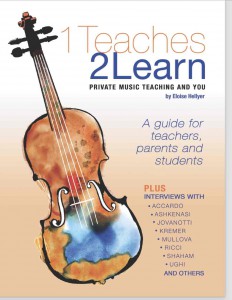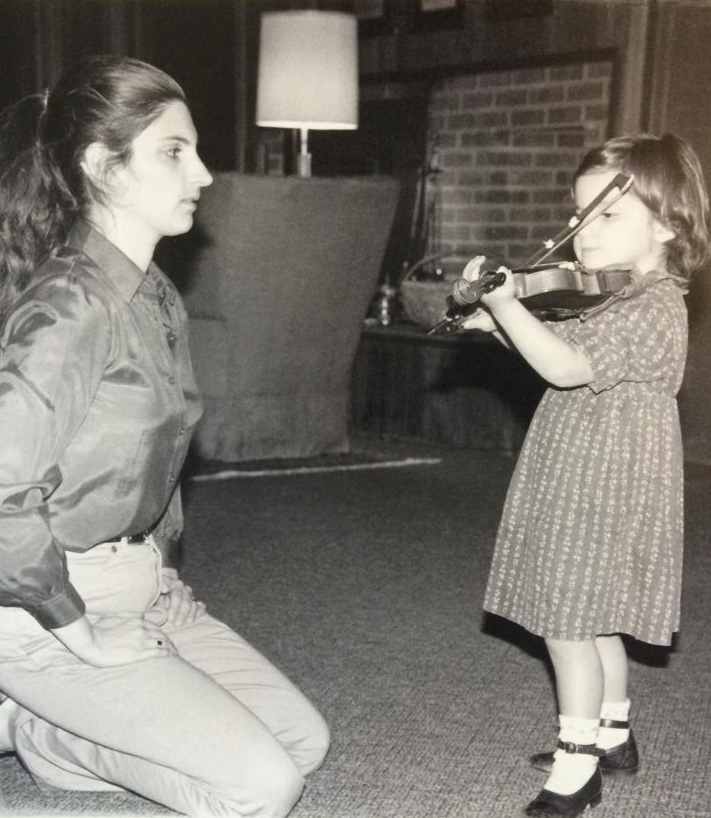New Non-New Students or What To Do When Faced with Disaster
What do you do when you get every teacher’s worst nightmare? New transfer students who have been so horribly taught that they have every bad habit in the book and a few no one has thought of yet (except them)?
Well, I can tell you what you don’t do. You don’t tell them.
- Never let on that you’re about to tear your hair out not knowing where to begin.
- Never let on that their previous teacher is a criminal who should be blindfolded and shot at dawn.
- Never let on that they are going to have to start over from scratch.
- Never let the student or the parent think that they have wasted time and money on previous lessons.
- Never let the student or parent think they have been a bad judge of teacher character or competence.
Why don’t you do this? You might think that this behavior is unethical. Yes, that is one reason. Another may be that you don’t want your student and his family to feel bad. Yes, that’s another. A third reason may be that you need time to discern if you have a poorly taught student in front of you – or just a poor one.
The real reason? Because none of the above is true. Let’s see point by point:
- Of course you know where to begin. Have them play something simple, find several things to compliment (you can always find something positive) and give them one little piece of technique to concentrate on, acting like it’s no big deal. It isn’t that complicated. Also, don’t let them see much of your other students until they have improved a bit – it can shake their self-confidence.
- You may know the teacher by reputation (or lack of it) and feel you may be justified in wanting to eliminate her from the face of the earth to prevent her from doing further damage, but the fact is that your student did continue with her for a number of years so he must have been getting something out of the lessons.
- You aren’t going to have to start over from scratch. The child probably already knows a lot of music and even reads it. It just isn’t that bad.
- The parents haven’t wasted time or money. Yes, it would be better if the child had studied with you all that time, but just having had the violin in his hands for a few years is better than nothing at all.
- Perhaps they really liked that other teacher and are stopping with her for logistical reasons. Perhaps the parents realized something was wrong but the child is still emotionally attached to that teacher and you may need to win him or her over. Therefore, you don’t want to look like someone who badmouths others – they will wonder about your ethics, or what you say about them behind their backs. Besides, it’s a waste of time. Your new student and his family in time will understand your superiority – you don’t need to flaunt it. And they will respect you for your discretion.
Having said all this, I have to confess that a lot of the first list is often true. But it isn’t going to help you or your student to think about it that way. Go straight to the second list and all will be well.
However, and this is a really big however, sometimes you have to confess that the other teacher didn’t necessarily give the correct information. The problem is that most children under the age of 14 or 15 blame themselves when they don’t learn well. They are not in a position to understand that incorrect teaching was really the problem. The parents don’t always understand this either until some time after they have changed to you. It’s the age old problem of people assuming that if someone knows how to do something, then that someone also knows how to teach it. This assumption often creates lots situations where I find myself with transfer students who are convinced they are incapable of playing well and I have to very delicately let them know that it isn’t their fault. It usually goes like this:
“I’m sure your other teacher told you this, but I’m going to remind you……..” Usually they will nod their heads, even if their other teacher never said a word about anything except the weather (this does happen), they then try to do as I ask and face is saved all around.
But what should you do when they say, “My teacher never told me that.” or worse, “Why didn’t my teacher tell me that?” Or “I wish my teacher had told me that?” And the parents ask the same questions?
There is a difference between badmouthing and telling the truth. There is also a difference between showing off your superior teaching technique and trying to help someone in difficulty. It’s all in what your intention is. Sometimes you have to do the “wrong thing” (i.e., speak badly of a colleague) for the right reason. There are always exceptions to almost every rule I can think of and we have to be flexible. Sometimes you just have to fess up and admit that some teachers are better at some things and others are better at others, if this is to the benefit of your student.
It is true that some musicians are fabulous performers but woeful at teaching. This can be very hard for children and inexperienced parents to understand. Sometimes I hear myself saying, “Your previous teacher is a wonderful person,” or “a fantastic violinist,” and leave it at that. Often this opens the floodgates and they tell me all kinds of awful things, while I demurely try to change the subject back to what we were doing, not agreeing, but not disagreeing either; it’s a good idea to keep the lesson about what is going to happen, not about what has already taken place.
However on occasion, but never at the first lesson and only after I have gained their trust, I have had to tell older transfer students outright that their bad playing isn’t their fault and if they will listen to me, we can fix everything lickety-split. The reason? They have a knee-jerk reaction/refusal to trying anything new or different because they are so used to failure. Sometimes you just have to level with them. Again, you are stating the truth and your intention is pure – even if they left their previous teacher because she wasn’t doing her job, the student may still remain psychologically affected by the poor teaching for some time afterwards. I have found that it may take up to a couple of years for the older ones to be convinced of their capacities, even though they may be making good progress meanwhile.
So gently tell the truth when absolutely necessary for the psychological and didactic health of your student, but the best thing to do in most cases is to let your work speak for itself. People will draw their own conclusions as lessons with you proceed and in the long run this is much better for everyone: you will have taken the high road, your students will be happy, and their parents as well.
Post author: Eloise Hellyer
Share this:
Buy it on www.sharmusic.com - eBook format, avaliable worldwide, paperback in North America
COPYRIGHT
ABOUT
A music teacher’s thoughts and observations on the teaching and the study of a musical instrument, hoping to be of help to parents, students and teachers.
PHOTO
AWARDED TOP 25 VIOLIN BLOG
CATEGORIES
TAGS
ARCHIVES
-
Agosto 2022
Agosto 2023
Agosto 2024
April 2015
April 2016
April 2017
April 2019
April 2020
Aprile 2022
Aprile 2023
Aprile 2024
August 2014
August 2015
August 2016
August 2017
August 2018
August 2019
August 2021
December 2014
December 2015
December 2016
December 2017
December 2018
December 2019
December 2020
Dicembre 2022
Dicembre 2023
Dicembre 2024
Febbraio 2022
Febbraio 2023
Febbraio 2024
February 2015
February 2016
February 2018
February 2019
February 2020
February 2021
Gennaio 2022
Gennaio 2023
Gennaio 2024
Giugno 2022
Giugno 2022
Giugno 2023
Giugno 2024
January 2015
January 2016
January 2017
January 2018
January 2019
January 2020
July 2015
July 2017
July 2019
June 2016
June 2017
June 2018
June 2019
June 2020
June 2021
Luglio 2022
Luglio 2023
Luglio 2024
Maggio 2022
Maggio 2023
Maggio 2024
March 2015
March 2016
March 2017
March 2018
March 2019
March 2020
March 2021
Marzo 2022
Marzo 2023
Marzo 2024
May 2015
May 2016
May 2018
May 2019
May 2020
November 2014
November 2015
November 2016
November 2017
November 2018
November 2019
November 2021
Novembre 2022
Novembre 2023
Novembre 2024
October 2014
October 2015
October 2017
October 2018
October 2019
October 2020
October 2021
Ottobre 2022
Ottobre 2023
Ottobre 2024
September 2014
September 2015
September 2016
September 2018
September 2019
September 2020
September 2021
Settembre 2022
Settembre 2023
Settembre 2024
RECENT POSTS
Terry G and Me, or Terry Gilliam on Where (or What) Practicing the Piano Will Get You…
The Teaching We Don’t Do Is More Important Than We Think
Overwhelmingness or What Teaching and Motherhood* Have in Common
Cellphone Serenity
How to Build Your Reputation – the Kind You Want
Desperate Times, Desperate Measures. Or How to Deal With Your Strong-Willed Stubborn Student and Survive
“Why Does My Teacher Get So Frustrated?” Letter to a Perplexed Student
Mount Rush-no-more….And How to Get There
Realizzato con VelociBuilder - Another Project By: Marketing:Start! - Privacy Policy




